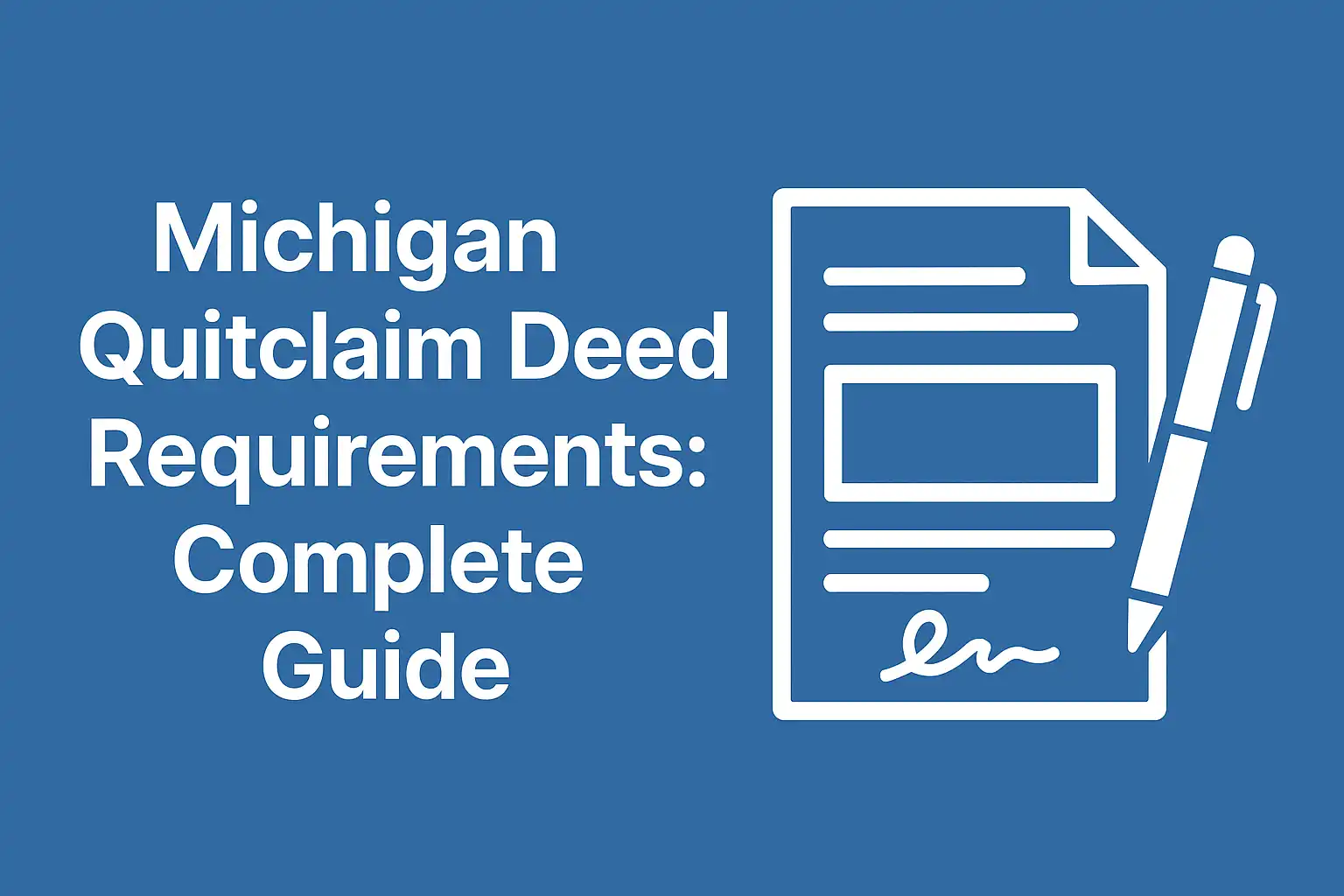
Michigan’s evolving real estate landscape, from Detroit’s urban revitalization to the state’s expanding suburban markets, presents complex transfer scenarios requiring precise documentation and regulatory compliance. The state’s comprehensive approach to property transfers integrates traditional deed requirements with modern property tax assessment protocols, making understanding of both legal and administrative procedures essential for successful transactions.
This technical guide examines Michigan’s quitclaim deed requirements through the lens of regulatory compliance and documentation standards, providing detailed insights for professionals managing complex multi-jurisdictional transactions and property owners navigating the state’s specific procedural requirements.
Introduction to Michigan’s Real Estate Legal Framework
Michigan operates under a sophisticated property transfer system that balances traditional real estate law with modern tax assessment and property valuation requirements. The state’s approach emphasizes documentation accuracy and regulatory compliance, reflecting both historical legal principles and contemporary administrative efficiency needs.
The Michigan real estate transfer system requires coordination between multiple governmental entities, including the Register of Deeds offices, County Treasurers, and local assessors. This multi-layered approach ensures comprehensive record-keeping while protecting property tax assessment accuracy and maintaining clear title records.
Michigan Compiled Laws (MCL) Section 565 provides the foundation for property conveyances, establishing both the legal framework for transfers and the technical requirements for documentation. Understanding these requirements becomes crucial for ensuring both legal validity and administrative compliance.
Legal Requirements Under Michigan Statutes
Statutory Framework and Validity Standards
MCL 565.3 defines a quitclaim deed as sufficient to convey all the estate the grantor could lawfully convey by a bargain and sale deed. The statute establishes that “A deed of quit claim and release, of the form in common use, shall be sufficient to pass all the estate which the grantor could lawfully convey by a deed of bargain and sale.”
Essential Legal Elements for Validity
Michigan quitclaim deeds must include specific statutory language and formatting to achieve legal validity:
Statutory Language Requirements: MCL 565.152 provides the form of a quitclaim deed, requiring language stating “[Party A] quitclaims to [Party B] (the legal description of the property) for a sum of (the consideration, including the designated price even if the price is set at $1).”
Grantor and Grantee Information: Michigan deeds must identify the current owner making the transfer (the grantor) and the new owner receiving the property (the grantee). The grantee’s mailing address must also be listed in the deed, though Michigan law no longer requires a “return to” address.
Consideration Statement: Michigan requires a statement of consideration that identifies the value given for the property. If the deed is subject to transfer tax, it must state the property’s total value or be accompanied by a completed Real Estate Transfer Tax Valuation Affidavit.
Document Formatting and Technical Standards
Michigan’s formatting requirements ensure consistent processing and recording standards across all counties:
Paper and Layout Specifications: MCL 565.201 requires standard or legal size paper (8.5 x 11 inches or 8.5 x 14 inches) with specific margin requirements and legible presentation standards.
Title Requirements: Documents submitted for recording must include a title identifying within the first printed line the recordable event evidenced by the document. More than one recordable event cannot be included within a single document.
Social Security Number Protection: If a Michigan deed includes any Social Security numbers, the first five digits of the SSN must be redacted to protect personal information.
Property Description Standards and Legal Requirements
Legal Description Accuracy and Standards
Michigan requires precise property descriptions that enable accurate identification and assessment. Property descriptions must provide sufficient detail for recording offices to properly index and assess the transferred property.
Legal Description Components: Michigan deeds must contain an accurate legal description of the property being transferred. The property’s tax ID number and physical address should also be included, if applicable, to facilitate accurate tax assessment and record-keeping.
Reference Documentation: Legal descriptions should reference existing recorded documents where possible to ensure consistency with established property records and prevent boundary disputes or assessment complications.
Multi-County Properties: For properties spanning multiple counties, the deed must clearly identify which portions lie within each county jurisdiction to ensure proper recording and tax assessment distribution.
Integration with Property Tax Assessment Systems
Michigan’s property description requirements integrate closely with the state’s property tax assessment system, requiring coordination between deed recording and tax assessment procedures.
Tax Parcel Integration: Property descriptions must align with established tax parcel identification systems to ensure seamless integration with assessment records and property tax obligations.
Assessment Implications: Accurate property descriptions facilitate proper assessment procedures and help prevent disputes regarding property boundaries or assessment jurisdiction.
Signature and Notarization Procedures
Execution Requirements and Standards
Michigan’s execution requirements balance accessibility with authentication, providing multiple options for proper acknowledgment while maintaining security standards.
Grantor Signature Requirements: MCL 565.8 requires the grantor to sign their name in front of a notary public, clerk of a court of record, or judge. This flexibility provides options for acknowledgment while maintaining proper authentication standards.
Notarization Standards: While most states require grantor signatures in the presence of a notary public specifically, Michigan provides broader acknowledgment options, including court clerks and judges, offering practical flexibility for various transaction circumstances.
Witness Requirements: Michigan does not require additional witnesses beyond the acknowledgment officer, streamlining the execution process while maintaining proper authentication through official acknowledgment.
Authentication and Documentation Standards
Acknowledgment Certificate Standards: Proper acknowledgment certificates must comply with Michigan standards and clearly identify the acknowledging officer, their authority, and the verification procedures followed.
Identity Verification: Acknowledging officers must verify grantor identity through appropriate identification documents and confirm the voluntary nature of the signature and transfer.
Record Retention: Acknowledgment officers should maintain appropriate records of the acknowledgment for potential future verification or legal proceedings.
Recording Procedures with Register of Deeds
County Recording Office Structure and Procedures
Michigan’s 83 counties each maintain independent Register of Deeds offices with standardized procedures and fee structures established by state law.
Recording Office Jurisdiction: MCL 565.201 requires filing quitclaim deeds with the register of deeds office in the relevant county where the property is built. Filing must occur in the county office of the property’s physical location rather than where the transaction took place.
Document Review Process: Register of Deeds offices conduct preliminary reviews to verify formatting compliance, required attachments, and fee payments before accepting documents for recording.
Indexing and Public Access: Recorded deeds are indexed by grantor and grantee names and become part of the public record, accessible for title searches and property research.
Recording Fees and Payment Requirements
Standard Recording Fees: MCL 600.2567 establishes a $30 recording fee when submitting any deed, including quitclaim deeds, to the register of deeds. This flat fee structure provides consistency across all Michigan counties.
Additional Services: Additional fees may include $5 to certify a recorded document and $1 per page to obtain copies of certified documents, providing options for official verification and duplication services.
Payment Processing: Recording offices typically accept cash, checks, and money orders, with specific payment requirements varying by county. Separate payments may be required for recording fees and transfer taxes.
Technology Integration and Modern Systems
Many Michigan counties have implemented electronic recording systems and online research capabilities, enhancing efficiency and accessibility for real estate professionals and property owners.
Electronic Recording: Counties offering electronic recording provide streamlined submission processes and faster processing times for qualified documents and registered users.
Online Research: Digital records systems enable efficient title research and property history verification, supporting due diligence and professional research requirements.
Property Transfer Affidavit Requirements
Understanding Michigan’s Property Transfer Affidavit System
Michigan requires Property Transfer Affidavits (PTA) for all property transfers, providing essential information for property tax assessment and valuation purposes. This requirement represents a unique aspect of Michigan’s property transfer system.
Legal Foundation: State Law requires a Property Transfer Affidavit to be filed whenever real estate is transferred, even if you are not recording a deed. The General Property Tax Act provides for penalties if this form is not filed.
Filing Timeline: The PTA must be filed within 45 days of the property transfer. Failure to meet this deadline results in penalties starting at $5 per day for residential properties or $25 per day for commercial properties.
Information Requirements: The affidavit requires detailed information about the transfer including total consideration, type of transfer, date of transfer, and whether the property will serve as the new owner’s primary residence.
Filing Procedures and Compliance
Submission Process: The completed affidavit must be filed with the local assessor for the city or township where the property is located. This filing triggers assessment review and potential taxable value adjustments.
Documentation Standards: The PTA requires comprehensive information including names and contact information for both grantor and grantee, property details, and transfer circumstances.
Penalty Structure: Penalties start at $5 per day for the first 30 days late, with a maximum of $200 for residential properties. Commercial and industrial properties face higher penalties up to $1,000.
Assessment and Tax Implications
Taxable Value Uncapping: Property transfers typically result in taxable value uncapping, where the property’s taxable value adjusts to match the state equalized value, potentially causing significant property tax increases.
Primary Residence Considerations: If the property will serve as the new owner’s primary residence, this information can qualify the owner for homestead property tax exemptions, resulting in substantial savings.
Transfer Exemptions: Certain transfers between family members or other qualifying relationships may be exempt from uncapping, preserving favorable tax treatment under specific circumstances.
Tax Implications and Transfer Tax Requirements
Michigan State Transfer Tax Structure
Michigan imposes both state and county transfer taxes on property transfers, with rates established by statute and varying by jurisdiction population.
State Transfer Tax: Michigan charges a real estate transfer tax on the consideration for the property at the time of sale. The state transfer tax is $3.75 per $500 of the property’s sales price, calculated in $500 increments.
County Transfer Tax: Each county can set an additional transfer tax rate. Counties with less than two million people can set an additional rate of $0.55 per $500, while counties with more than two million people can set an additional rate of no more than $0.75 per $500.
Calculation Method: Transfer tax calculations round up to the next $500 increment, ensuring comprehensive coverage of the property’s full value for tax purposes.
Transfer Tax Exemptions and Compliance
Common Exemptions: Michigan law lists multiple categories of deeds exempt from transfer tax, including:
- Transfers where consideration is less than $100
- Transfers between spouses creating or dissolving tenancy by entireties
- Transfers from parents to children or grandchildren
- Court-ordered transfers without specific monetary consideration
- Quitclaim deeds to correct title flaws
Documentation Requirements: Exempt transfers must cite the specific statute under which the transfer is exempt, providing clear documentation of exemption eligibility for recording purposes.
Valuation Affidavit: Properties subject to transfer tax must include a completed Real Estate Transfer Tax Valuation Affidavit providing detailed valuation information for tax calculation purposes.
Professional Tax Planning Considerations
Strategic Planning: Understanding exemption categories enables strategic planning for family transfers and estate planning transactions to minimize tax obligations while achieving transfer objectives.
Multi-Jurisdictional Considerations: Properties spanning multiple counties require careful calculation of transfer tax obligations to each affected jurisdiction based on property value allocation.
Professional Consultation: Complex transfers benefit from professional tax advice to optimize exemption utilization and ensure compliance with both state and federal tax requirements.
Special Considerations for Michigan Properties
Detroit Revitalization and Urban Property Considerations
Detroit’s ongoing revitalization presents unique opportunities and challenges for property transfers, requiring understanding of urban development programs and special assessment considerations.
Development Incentives: Various development incentive programs may affect property values, tax assessments, and transfer procedures, requiring careful consideration during quitclaim deed transactions.
Special Assessment Districts: Urban properties may be subject to special assessments for infrastructure improvements or development programs, affecting property values and transfer considerations.
Title Research Importance: Urban properties with complex ownership histories benefit from thorough title research to identify potential issues before accepting quitclaim deed transfers.
Rural and Recreational Property Considerations
Michigan’s extensive rural and recreational property markets present unique transfer considerations requiring specialized knowledge of agricultural, forestry, and water access rights.
Agricultural Property Transfers: Transfers of agricultural property may qualify for special tax treatment or assessment categories that affect both transfer taxes and ongoing property tax obligations.
Water Rights and Access: Properties with water access rights require careful documentation of these rights in property descriptions and transfer documentation.
Mineral Rights Considerations: Some properties involve separate mineral rights ownership that may not transfer with surface rights, requiring specific disclosure and documentation.
Technology Integration and Modern Recording Systems
Michigan counties increasingly utilize technology to streamline recording processes and provide enhanced services for real estate professionals and property owners.
Electronic Recording Systems: Many counties offer electronic recording capabilities that reduce processing time and provide immediate confirmation of recording completion.
Digital Records Access: Online records systems enable efficient title research and property history verification, supporting professional due diligence requirements.
Automated Tax Calculation: Some jurisdictions provide automated transfer tax calculation tools that ensure accurate payment and reduce processing delays.
Common Mistakes and Prevention Strategies
Documentation and Preparation Errors
Inadequate Legal Descriptions: Using incomplete or inaccurate property descriptions creates recording problems and potential boundary disputes. Copying descriptions from current recorded documents prevents these issues.
Missing Required Elements: MCL 565.152 requires specific language including consideration statements and proper quitclaim terminology. Thorough template review ensures compliance with statutory requirements.
Social Security Number Violations: Failing to redact Social Security numbers violates Michigan privacy requirements and creates recording delays.
Filing and Compliance Mistakes
Property Transfer Affidavit Delays: Missing the 45-day filing deadline for Property Transfer Affidavits results in significant penalties and assessment complications.
Incorrect County Filing: Filing in the wrong county due to misunderstanding property location or transaction location creates validity problems and requires corrective action.
Transfer Tax Calculation Errors: Misunderstanding exemption eligibility or calculation methods results in incorrect payments and recording delays.
Legal and Strategic Oversights
Inadequate Risk Assessment: Quitclaim deeds provide no warranty protection, making understanding of title risks essential before accepting transfers.
Assessment Impact Oversight: Failing to consider property tax assessment implications can result in unexpected tax increases following transfer.
Professional Consultation Timing: Complex transfers benefit from early professional consultation to identify potential issues and optimize outcomes.
Professional Resources and Consultation Recommendations
Legal and Title Professional Services
Real Estate Attorney Consultation: Complex ownership situations, high-value transfers, or unusual circumstances warrant professional legal review to ensure proper documentation and protection.
Title Company Services: Professional title searches and insurance provide valuable protection against hidden title problems and facilitate comprehensive due diligence.
Estate Planning Integration: Transfers involving estate planning considerations benefit from coordination with estate planning attorneys to ensure optimal outcomes.
Technical and Compliance Support
Tax Professional Guidance: Understanding transfer tax implications and Property Transfer Affidavit requirements helps ensure compliance and optimize tax outcomes.
Surveying Services: Properties with boundary questions or complex descriptions benefit from professional surveying to ensure accurate documentation.
Assessment Appeal Specialists: Properties facing unexpected assessment increases following transfer may benefit from professional assessment appeal representation.
Industry Authority and Professional Standards
For complex transfers requiring comprehensive documentation or multi-jurisdictional coordination, Deeds.com provides authoritative guidance and professional preparation services ensuring compliance with Michigan’s specific requirements.
Professional deed preparation becomes particularly valuable for transfers involving multiple properties, complex ownership structures, or coordination with estate planning and tax optimization strategies. The investment in professional services typically provides substantial protection against costly errors and regulatory complications.
When coordinating with real estate professionals, title companies, and legal counsel, Deeds.com’s expertise in Michigan deed requirements and property transfer procedures provides essential support for achieving optimal outcomes while maintaining regulatory compliance and cost efficiency.
Step-by-Step Process for Michigan Quitclaim Deeds
Phase 1: Pre-Transfer Documentation and Research
Title and Property Research: Obtain current property deed and verify legal description accuracy. Research property tax status and confirm any outstanding liens or encumbrances that may affect the transfer.
Property Transfer Affidavit Preparation: Begin preparation of required Property Transfer Affidavit information, including property details, transfer circumstances, and party information required for assessment purposes.
Transfer Tax Analysis: Determine transfer tax liability based on consideration amount and evaluate potential exemption eligibility to optimize tax obligations.
Phase 2: Document Preparation and Compliance Verification
Deed Drafting: Prepare quitclaim deed following Michigan statutory requirements, ensuring inclusion of required language, proper formatting, and complete property descriptions.
Content Verification: Verify all required elements including grantor and grantee information, consideration statements, legal descriptions, and statutory language compliance.
Affidavit Completion: Complete Property Transfer Affidavit with accurate information regarding transfer details, consideration, and primary residence status for assessment purposes.
Phase 3: Execution and Authentication
Signature Coordination: Arrange for grantor signature in the presence of qualified acknowledgment officer (notary public, court clerk, or judge) according to Michigan requirements.
Authentication Standards: Ensure proper identity verification and acknowledgment certificate completion according to Michigan standards.
Document Protection: Secure executed documents in preparation for recording and maintain copies for personal records.
Phase 4: Tax Compliance and Payment Preparation
Transfer Tax Calculation: Calculate final transfer tax obligations or confirm exemption status with appropriate documentation and statutory citations.
Valuation Affidavit: Complete Real Estate Transfer Tax Valuation Affidavit if required for transfer tax calculation and recording compliance.
Payment Preparation: Prepare recording fees, transfer taxes, and any required certifications in appropriate payment methods accepted by the recording office.
Phase 5: Recording and Post-Transfer Compliance
County Filing: Submit completed quitclaim deed, required affidavits, and payments to the Register of Deeds office in the county where the property is located.
Property Transfer Affidavit Filing: File Property Transfer Affidavit with the appropriate local assessor within 45 days of transfer to avoid penalties.
Confirmation and Follow-up: Verify successful recording, obtain recorded documents, and monitor for assessment changes or exemption applications as appropriate.
Professional Notification: Notify relevant parties including mortgage lenders, insurance companies, and tax assessors of ownership changes to ensure proper account maintenance.
Legal Disclaimer: This guide provides general information about Michigan quitclaim deed requirements and should not be construed as legal advice. Property transfers involve significant legal and financial implications, and professional consultation is recommended for complex situations. Always verify current law and local practices before proceeding with property transfers.


Leave a Reply